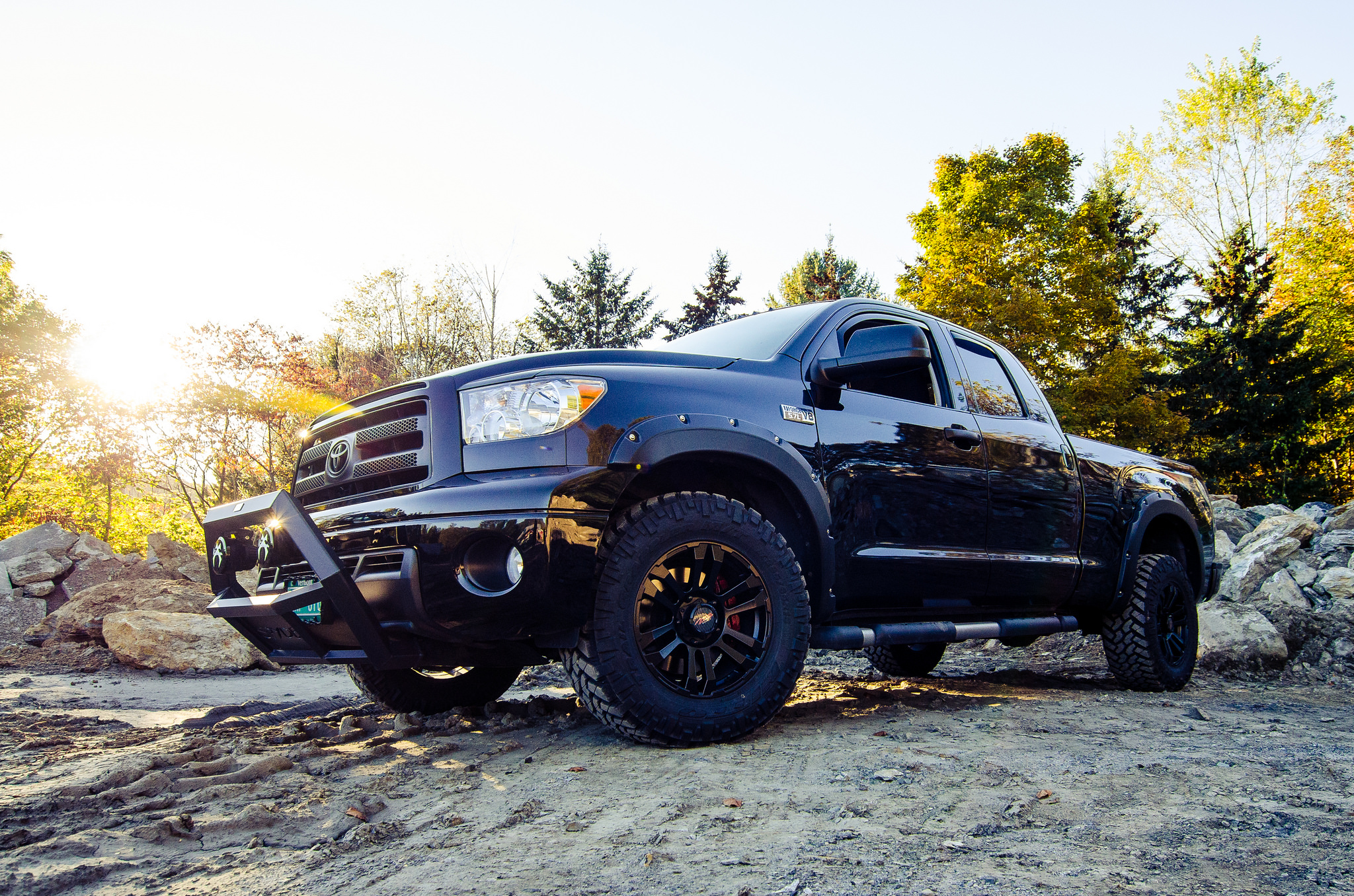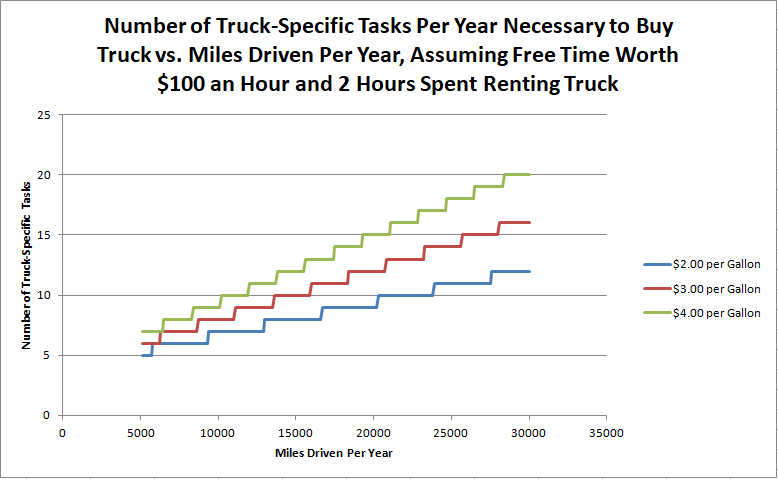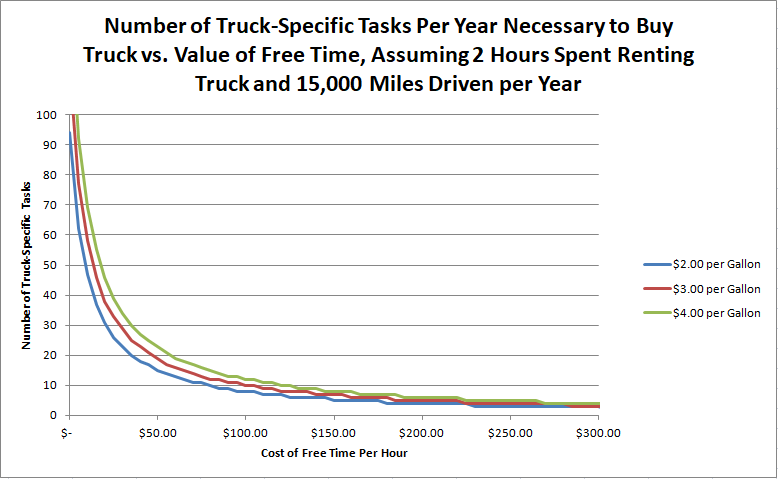I'm from the South, and people in the South (and elsewhere in America's heartland) really love their pickup trucks. I get it, they are big, powerful, utilitarian, and, in a word: manly.

What? You don't have a lifted 4x4 Z71 with a hemi and a compass in the stock and this thing which tells time?! Pussy.
Image Credit
But I've just never felt the desire to own a truck. Truth be told, I've never even driven one. I drove mostly SUVs in my early driving career and have been on the sedan bandwagon for several years now. I was hesitant about driving a sedan at first, because it seemed so boring and pedestrian, but I grew to really love sedans because they just feel so much more nimble and quick than bigger automobiles. After living in midtown Atlanta for 5 years, I wouldn't even consider owning a huge truck, because navigating that thing around crowded streets and tight parking lots seems like an absolute nightmare.
Now, I understand if you live on a farm and are constantly carting around big heavy things, then a truck is the sensible vehicle for you. But I also know quite a few people who do not live on farms, they live in suburban neighborhoods with small yards and use their truck mainly to drive on paved roads to their job everyday...where they sit behind a desk. To these people I inquire, "do you really need a truck?"
What's more, I feel like these people are also the most likely to brag about their trucks. They tend to buy the biggest, most powerful, most rugged trucks...and they don't even use them for anything truck-related! I know some people are quick to make the joke "huh, they must be compensating for something (wink wink)", but I actually don't think it's compensation for lack of a large endowment in the physical sense, it has more to do with the lack of confidence in their own manliness (sort of your emotional endowment, if you will).
I think behind every suburban truck owner is a man (perhaps a woman, but let's be real it's probably a man) who, deep in his psyche, wants to be a cowboy out on the open range, and is lowkey depressed that he lives in the suburbs and works behind a computer all day. I could be wrong, but if I am, then why does every truck commercial feature a truck either on a farm/ranch or on a construction site doing real rugged, manly work? Obviously, the people who actually do these jobs don't need a commercial to tell them that trucks are useful for their job, so I'd argue that the commercials are aimed at people who really don't need a truck, but still want so badly to believe that they do.
That being said, even the pedestrian truck owner still probably does some "truck things" every now and then, which could seem to justify having bought a truck. They could be like Frank "The Tank" Ricard and have a pretty nice little Saturday at Home Depot...
Many people may think that if you ever have any need for a truck, then it justifies owning one. And if you think this, then I'm gonna let you in on a little secret: you can rent a truck. It's fairly cheap too, a quick search on U-Haul revealed that it can be as low as $20 per day (plus a small mileage charge). So if you know you will need to cart stuff around all day on a Saturday, then you can just go down to the nearest moving truck company and make that happen.
That being said, the process of renting a truck is probably pretty annoying, you have to drive to the place, fill out some paperwork, take it back, etc. etc. This process takes time, and time is money. How much money is a more difficult question to answer, and is heavily dependent on the individual. I've said in the past that I tend to use the metric that my free time is worth $100 an hour when making decisions such as this. Now, that's a lot more than I make in an hour at work, but when calculating the cost of free time you can't think of it in terms of "how much money could I make in this amount of time", you have to think "how much money would I be willing to spend if this thing could be done for me, instantly?"
Even if you don't want to rent a truck, there are still other options for you. Most places such as furniture stores or home improvement stores offer delivery right to your house (because they don't want to limit their market to only people who own trucks). Sometimes it's even free! Even if it's not, they usually charge less than $100, which, if your time is valuable, is well worth the money. As a bonus, if you pay the company to deliver to your house, then they unload it for you, rather than you having to do it yourself. And trust me, if you throw your back out trying to move a dishwasher into your house then you are going to be sitting on your couch in agony, wishing you'd paid $100 to have it moved for you.
The above examples seem to me like they probably encompass about 90% of the things that a suburban dad would need a truck for, but there are a couple other examples for areas where a truck would be necessary, and renting one may not be a good option:
- Off-roading: I know a lot of people who say they love off-roading, so they get the big truck with the super rugged tires and such...but I mean...how often are you really going off-roading? Be honest with yourself...is it really worth buying the massive truck for?
- Hunting: Now, a truck bed is certainly the best place to put a slaughtered deer carcass, but sedans can have some pretty decently spaced trunks, so depending on the size of the deer I think it'd be doable. Might wanna put a tarp or something down though...
- Owning a Boat: Boats are big and heavy, so they need a truck or something with a lot of torque to tow them. Renting a truck is probably not a great option since it may not have enough power, or may just look goofy. The much simpler solution to this dilemma is DON'T BUY A BOAT! Heed the wise words of the late publisher Felix Dennis: "If it flies, floats, or fornicates, always rent it." At the very least, I'd say that if you buy a boat, you should already have a lakehouse where the boat will reside. That way you never need to tow it anywhere.
All Things Considered, How Many "Truck Things" Do I Need To Do For It To Be Cheaper To Own A Truck?
Alright, we finally get to the meat of this article. You've read the arguments, you've understood the tradeoffs, and now you want to know if you should buy a truck because you have to move furniture every so often and you hate the shame of driving a rental.
Well, there is indeed a crossover point when the time and money it takes to work around the issue of not having a truck is more than the added cost of owning a truck.
In order to determine this, I did a little trade study between two automobiles: the Toyota Tundra and the Toyota Camry. Obviously, if you buy an old, beat up truck then it's going to be less expensive than if you buy a brand new BMW M4, so I wanted the vehicles to be made by the same manufacturer as it limits disparity related to selling costs and maintenance. Toyota was chosen because the Camry and Tundra are both reasonably popular vehicles in their respective classes, so I felt like it was a fair comparison. I also assumed that both vehicles would be purchased new based on the "as shown" price on Toyota's website. This is significantly more than the base price, but is probably closer to the price one would actually pay for the car (you have to be careful looking at "base" prices, they tend to be bait-and-switches). In any case, the raw costs do not matter as much as the price differential.
From the website, I determined that the Tundra would cost $47,080 for the "as shown" model, and the Camry would cost $35,345 for the "as shown" model, a difference of $11,375 in favor of the Camry.
In order to cap this off in some sort of realistic way, I assumed that we will keep each of these cars for 10 years and then sell them. Their selling price is based on 10% depreciation per year, which is probably pretty close to the Kelly Blue Book value. With this considered, the Camry will be sold for $12,324 and the Tundra will be sold for $16,415. This means that the average cost to own each car for 10 years comes out to $2,302.10 per year for the Camry and $3,066.42 per year for the Tundra. This is a difference of $764.33 per year in favor of the Camry.
But that's just the cost to buy the car, what about the cost to actually drive it? The average fuel economy (combined highway and city) for the Camry is 35 MPG, whereas the average fuel economy for the Tundra is a whopping 17 MPG (sadly better than my high school car). How this difference affects the total cost is dependent on how many miles you drive per year and how expensive gas is, both of which are factored into the charts below.
On top of that, there are maintenance costs. Toyota has a pretty good track record for maintenance, and the Camry and Tundra both score pretty well. The Camry, however, has a slight edge according to repairpal.com, with an average yearly cost of $374.00 as opposed to $584.00 for the Tundra.
There is also insurance, but that will depend a lot on the driver and the company, so I'll just assume they are roughly equal.
Now that we have some hard numbers, let's look at some charts!
The two charts above tell basically the same thing, but with different variables manipulated. The top chart varies the amount of miles driven per year on the x-axis and gives the number of truck-specific tasks that need to be done per year in order to make a truck cost-effective. It assumes that free time is worth $100 an hour, where this free time is presumably used to rent a truck or make arrangements for a truck work-around in the event that a truck is needed. There are three lines shown that denote different gas prices.
The bottom chart varies the value of free time (still assuming that 2 hours of free time are spent for a truck work-around) with the same output, and the same three lines for different gas prices and an assumed yearly mileage of 15,000 miles.
As you can see, the value of free time has a considerable impact on the "break-even" point if your time is cheap, and a lesser impact above about $75 an hour. Meanwhile, the amount of miles driven per year combined with gas cost has a fairly marginal effect for a time value of $100 per hour.
Keep in mind that a delivery charge of $100 would equate to a time value of $50 per hour, since all the graphs assume 2 hours of free time. We can see from this that if you solely need a truck for delivery purposes then you'd need to get things delivered about 15-25 times per year in order to justify buying a truck.
Conclusion
Cars and trucks both have their pros and cons. Trucks, while able to haul a bunch of stuff, are cumbersome, hard to park, not very agile, and more expensive to own.
If you live on a farm and/or have a need to cart around big heavy things on a daily or even weekly basis, then yes, go ahead and buy a truck. If you go to Home Depot maybe once a month to get tiles or sod or whatever people get at Home Depot, then it's questionable that a truck is the right vehicle for you. The better thing to do would probably be to buy an old, beat up truck as a second vehicle that you use for these purposes (and to teach your kid to drive one day).
I know this probably isn't going to change the minds of any hardcore truck fans, and hey, if you like driving around in a legalized tank, then go for it. Keep in mind, though, that once you get a truck you will draw the attention of all your friends who took my advice and didn't buy one, so you're probably going to have to help them move stuff every weekend (this cost was not included in the calculations).
So if you love the feeling of driving a truck, then I'm not here to stop you. Just understand how much extra it is costing you, and ask yourself if that feeling is really worth it. And if you're worried that people won't think you are a "real man" if you don't drive a truck, then just remember this: a real man always uses the best tool for the job, and if you drive a truck on a long commute then that's like using a sledge hammer to hang a picture frame.





The "3 F's" slogan gave me a chuckle!! Hunters have to have a truck to show off their trophy!